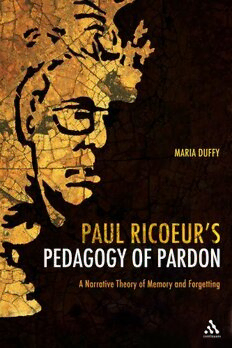Download Paul Ricoeur's Pedagogy of Pardon: A Narrative Theory of Memory and Forgetting PDF Free - Full Version
Download Paul Ricoeur's Pedagogy of Pardon: A Narrative Theory of Memory and Forgetting by Maria Duffy in PDF format completely FREE. No registration required, no payment needed. Get instant access to this valuable resource on PDFdrive.to!
About Paul Ricoeur's Pedagogy of Pardon: A Narrative Theory of Memory and Forgetting
Paul Ricoeur's "Pedagogy of Pardon" describes how memory is structured, in culture, civic identity and religion - and addresses central conceptual and methodological issues in his theory of forgiveness (or reconciliation). Where conflict arises from the clash of cultures, memory also becomes a tool to help resolve and heal past wounds. Ricoeur provides a hermeneutical key to examine conflicting narratives so that some shared truths can be arrived at in order to begin afresh. As the many Truth Commissions around the world illustrate; revisiting the past has a positive benefit in steering history in a new direction after protracted violence.A second deeper strand in the book is the connection between Paul Ricoeur and John Paul II. Both lived through the worst period of modern European history (Ricoeur a Prisoner of War for four years in WWII and John Paul, who suffered under the communist regime). Both have written on themes of memory and identity and share a mutual concern for the future of Europe and the preservation of the 'Christian' identity of the Continent as well as the promotion of peace and a civilization of love. The book brings together their shared vision, culminating in the award to Ricoeur by John Paul II of the Paul VI medal for theology (July 2003) - only conferred every five years - for the philosopher's fruitful research in the area of theology and philosophy, faith and reason and ecumenical dialogue.
Detailed Information
| Author: | Maria Duffy |
|---|---|
| Publication Year: | 2009 |
| ISBN: | 9781847064745 |
| Pages: | 190 |
| Language: | English |
| File Size: | 3.416 |
| Format: | |
| Price: | FREE |
Safe & Secure Download - No registration required
Why Choose PDFdrive for Your Free Paul Ricoeur's Pedagogy of Pardon: A Narrative Theory of Memory and Forgetting Download?
- 100% Free: No hidden fees or subscriptions required for one book every day.
- No Registration: Immediate access is available without creating accounts for one book every day.
- Safe and Secure: Clean downloads without malware or viruses
- Multiple Formats: PDF, MOBI, Mpub,... optimized for all devices
- Educational Resource: Supporting knowledge sharing and learning
Frequently Asked Questions
Is it really free to download Paul Ricoeur's Pedagogy of Pardon: A Narrative Theory of Memory and Forgetting PDF?
Yes, on https://PDFdrive.to you can download Paul Ricoeur's Pedagogy of Pardon: A Narrative Theory of Memory and Forgetting by Maria Duffy completely free. We don't require any payment, subscription, or registration to access this PDF file. For 3 books every day.
How can I read Paul Ricoeur's Pedagogy of Pardon: A Narrative Theory of Memory and Forgetting on my mobile device?
After downloading Paul Ricoeur's Pedagogy of Pardon: A Narrative Theory of Memory and Forgetting PDF, you can open it with any PDF reader app on your phone or tablet. We recommend using Adobe Acrobat Reader, Apple Books, or Google Play Books for the best reading experience.
Is this the full version of Paul Ricoeur's Pedagogy of Pardon: A Narrative Theory of Memory and Forgetting?
Yes, this is the complete PDF version of Paul Ricoeur's Pedagogy of Pardon: A Narrative Theory of Memory and Forgetting by Maria Duffy. You will be able to read the entire content as in the printed version without missing any pages.
Is it legal to download Paul Ricoeur's Pedagogy of Pardon: A Narrative Theory of Memory and Forgetting PDF for free?
https://PDFdrive.to provides links to free educational resources available online. We do not store any files on our servers. Please be aware of copyright laws in your country before downloading.
The materials shared are intended for research, educational, and personal use in accordance with fair use principles.

